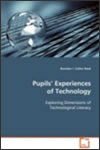Element 2 Aspect 2: Technological knowledge
Teacher Education – Pre-service
Element 2
Aspect 2: technological knowledge
Recognise that technology has its own domain knowledge.
Aspect Purpose
To support student teachers' awareness that technological knowledge allows active participation in, contribution to, and critique of the technological world.
Key Words: Domain knowledge, technological knowledge, active participation, contribution, critique, technological world.
Resources
Book Chapter
Fasciato, M. (2002). "Designing – what does it mean at Key Stages 2 and 3", in Sayers, S., Morley, J., and Barnes, B. Issues in design and technology teaching. London: Routledge Falmer.
Review Statement
This chapter deals with a range of fundamental questions concerning design in technology education in a UK context. It begins with defining design within the National Curriculum and give consideration to the nature of the design process, and explores problems associated with using a design process in schools.
Considering designing from a psychologists point of view, the text discusses when children are ready to engage with the production of design drawings and what other tools children might use for the same purpose. It concludes by suggesting that the process of designing is made up of a wide range of skills, abilities, and perceptions, which cannot easily or conveniently be grouped within a simple framework that is convenient to teach.
In addition, the chapter suggests that children need to have developed a wide range of cognitive skills before they can effectively develop design skills.
Keywords: cognitive skills and development; design process; psychologists perceptions of designing.
Reviewed by Bruce Granshaw.
Journal Article
"Technology as Knowledge: Implications for Instruction"
Herschbach, D. R. (1995). Technology as Knowledge: Implications for Instruction. Journal of Technology, 7(1), pp. 31-42 scholar.lib.vt.edu/ejournals/JTE/v7n1/pdf/herschbach.pdf
Review Statement
Although a little dated now, this article provides an interesting discussion about the notion of technological knowledge. The author discusses the words "technological knowledge" and offers a definition for these. He debates the relationship between technology and science and finally identifies forms of technological knowledge.
Interestingly, Herschbach identifies instructional implications and finishes with a suggestion that technology's forte may be in its interdisciplinary character.
Key phrases: technological knowledge, instructional implications.
Reviewed by Gary O'Sullivan.
Book Chapter

Pupils' experiences of technology: Exploring dimensions of technological literacy. Collier-Reed, B. I. (2008). VDM Verlag ISBN:9783639093537
Review Statement
Ensuring people are technologically literate has become an issue of major significance with an ever-increasingly technological world.
In order to clearly understand the various dimensions of technological literacy, this book looks at secondary-school pupils' conceptions of technology and the nature of their interactions with technological artefacts. The book takes a qualitative methodological approach to understanding and describing these experiences.
Of key importance is that empirical data were collected from the perspective of the pupils themselves, an important requirement of the methodological framework adopted. There have been many studies around pupils and technology, but nearly all are based on a priori categories constructed by experts, rather than being constituted from the pupils' perspective.
As such, this book contributes towards filling a gap in the literature, and should be useful to anyone concerned about the current levels of technological literacy in society and those looking for a framework that can help them to make an impact on improving the level of technological literacy of young people.
Keywords: Views of technology, technological literacy, secondary technology
Reviewed by Mike Forret
Book
Testing Teacher Knowledge for Teaching in Primary School. Rohan, E., (2010). Delft: Eindhoven University of Technology. ISBN 978-90-386-2055-8
Review Statement
This is a publication of Ellen's doctoral thesis based on pedagogical content knowledge (PCK) and subject matter knowledge (SMK). The study measured teachers' pedagogical content knowledge and investigated how teachers' PCK influenced students' attitudes in technology. Ellen recommends initial education programmes (ITE) programmes focus on acquiring and developing both PCK and SMK .
Keywords: pedagogical content knowledge, subject content knowledge
Reviewed by Wendy Fox-Turnbull
